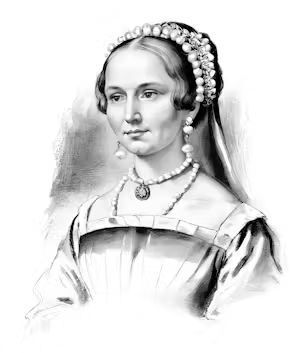Marguerite de Navarre
1492–1549
The Princess Protector
With a millennium of Roman Catholicism under its crown, early sixteenth-century France was hardly a friend to Protestant proselytes. Question the Vulgate, face interrogation. Endorse Luther’s or Calvin’s teachings, prepare to learn a lesson in heresy. Deny papal authority, deny yourself sight of the sun, or even chance at life itself. The French king would have his Roman Catholic way — that is, unless his Reformed sister stepped in.
Dangerous Reading
The only sibling of Francis I (r. 1515–1547), Marguerite de Navarre received an education fit for an heir presumptive, and not just a princess-sister. Their mother, Louise de Savoy, a learned woman herself, seemed to spare no text or philosophy when it came to both her children’s instruction. Perhaps Louise was the first to expose Marguerite to the controversial figure of Erasmus and, through Erasmus’s Christian humanism, the original Greek New Testament.
Forced to marry in 1509, Marguerite found herself with not only a husband, but a surprising amount of time alone, with open access to her new spouse’s resources. (Charles, Duke of Alençon, preferred to be away, hunting.) So, though her name had changed, her interests had not. She would spend most of her time in Alençon, building a diverse library, dining with Renaissance poets, conversing with evangelical preachers, and serving the poor.
When her brother donned the French crown in 1515, Marguerite’s newfound Catholic limelight did not stop her from reading “dangerous” Protestant works, most notably those of Martin Luther. The same year his Ninety-Five Theses shook Germany, she requested a French translation. His writings confirmed what Marguerite’s own reading had begun to uncover: God’s word and Christ’s work, the nature of forgiveness and saving faith — they were not exactly as the Catholic Church and Latin Vulgate made them seem.
Sensitive in Spirit
When Pope Leo X excommunicated Martin Luther in 1521, Marguerite appeared in disarray. She loved the Church, but why did they hate the priest and professor she so admired — better yet, the one she thought so scriptural?
The conflicted Marguerite sought counsel from members of the Circle of Meaux, a group of French evangelicals who embraced many Reformation teachings, like justification by faith alone and sola Scriptura. By confiding in such Christians, Marguerite proved herself more sensitive to Scripture’s truths and the Spirit’s leading than France’s religious and social standards, no matter how powerful, even threatening, those standards may have been.
After all, Marguerite possessed her own degree of power. She began to wield it not merely to pursue her convictions from within the Catholic Church, but to shield French Protestants who stood, upright yet unprotected, outside of it.
The Power of Power
Marguerite was more than family to the French King — she was a beloved, even esteemed sister. Francis dismissed complaints of Marguerite’s Protestant bent, saying, “If what you say is true, I love her too well to allow her to be troubled on that account” (Reformation Women, 30).
Francis would do far more than let Marguerite alone. She could speak openly of Christ in the Catholic court, winning other nobles to Reformed convictions. And were those same nobles to find themselves imprisoned for their newfound faith, they could expect Marguerite to plead freedom on their behalf. Her brother often granted the request, along with many others.
In 1527, she added “queen” to her list of high stations. Her first husband killed in battle, she married Henry d’Albret, King of Navarre, a mountainous region situated between Spain and France. When Marguerite traded Paris for Nérac, Navarre’s capital, she lost sway over her brother’s rulings. But as Queen of Navarre, she gained another kind of protective power: the power of asylum.
Though her new husband was Catholic, sometimes aggressively so, her new kingdom was historically tolerant of other religions. Marguerite extended Nérac as a city of refuge for those fleeing persecution. None other than John Calvin himself once met safety at Marguerite’s hands.
One Queen to the Next
Though Marguerite never ceased to enjoy personal safety and freedom of speech, her footing in others’ well-being would slip as time went on, especially after the fall of 1534. In what is known as the Affair of the Placards, posters disparaging the Mass were secretly hung across France, most infamously on Francis’s bedchamber. One part fooled and three parts fuming, the king would now allow far greater violence against Protestants. Spite triumphed over love for a sister, and people like her printer, Antoine Augereau, were hanged for their faith.
Perhaps Marguerite’s Reformed convictions also waned as she aged. She cut ties with Calvin after he publicly criticized men she trusted. And though Marguerite’s writings had long rejected unbiblical Catholic rituals, later in life she feasted in honor of St. Martin. Was she endorsing the cult of the saints or appeasing a brother and king? Her motivation remains a mystery.
What we do know is that Marguerite de Navarre desired to see God’s word accessible, his Son exalted, his church united. And before she died, Marguerite would hope that more — much, much more — might be said of her only surviving child one day.
God, I am assured, will carry forward the work He has permitted me to commence, and my place will be more than filled by my daughter, who has the energy and the moral courage, in which, I fear, I have been deficient. (Reformation Women, 39)
In Jeanne d’Albret, future Queen of Navarre and lionhearted defender of the French Reformation, God would indeed carry forward the work of Marguerite, the princess protector.
For further reading:
The French Huguenots and Wars of Religion by Stephen M. Davis
Women and the Reformation by Kirsi Stjerna
Tanner Swanson works from home as a wife, mother, and editor. She and her husband, T.J., live in Denver, Colorado, with their sons.


